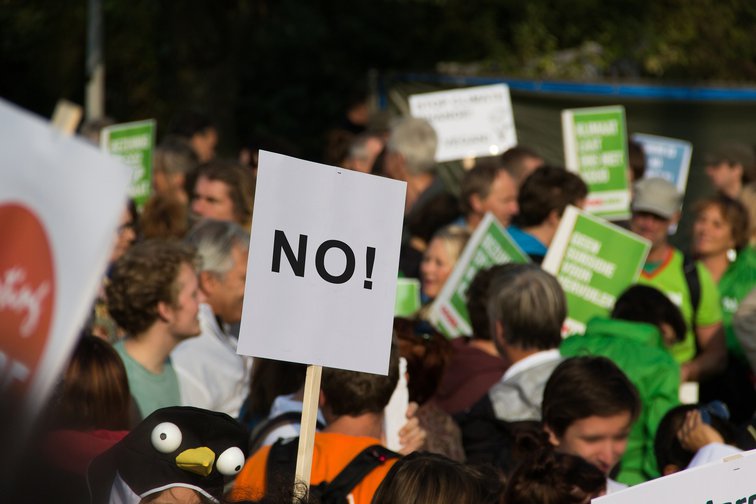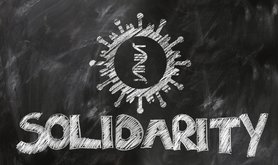
Activists don’t need to be so off-putting
What might happen if activists and non-activists could see that they have more in common than they think?

When I began my first job as a professional campaigner for Amnesty International in 2003, the reactions were rarely neutral - a mixture of discomfort, devil’s advocacy and admiration. But it wasn’t only the fact of the job that provoked these reactions. It was the way I spoke, the intensity of my passion. I’d get so wound up with righteous fury, talking even faster than I usually do, that people would regularly ask, ‘are you ok?’
They also seemed alienated. An angry activist isn’t easy to listen to, and for years I made dinner table conversation unbearable. Like many other progressive activists I would preach tolerance of all diversity… except for those with whom I disagreed. And people felt that judgment, reacting against the person who made them feel bad: me, ‘the activist.’ Students of sociology and political psychology know that we are prone to form group identities in opposition to each other, so an activist, speaking as an activist, may close down the very conversations they want to have.
This matters because activism matters. It feels more necessary than ever. And it’s more visible than it has been for decades, with new movements emerging to challenge old and increasingly pressing problems, like Black Lives Matter, Me Too, Extinction Rebellion, and the school strikes for climate. So making activism more inclusive and less alienating is vital. In which case, what’s really going on, what can we do about it, and how much is the activist’s responsibility?
I’ve interviewed activists about this question, mostly in the UK. I’ve also spoken to people who are not engaged in activism about how they feel - those who support the cause of justice, equality and the environment but are put off by what they see as the activist identity and its emotionality, hypocrisy and smugness. They don’t like being told what to do, or being made to feel bad for not acting or for having a particular lifestyle.
We’ve got a newsletter for everyone
Whatever you’re interested in, there’s a free openDemocracy newsletter for you.
There are activist movements grappling with the challenges of speaking across the gap. But even when they are explicit about not vilifying their opponents, they can still be off-putting. Extinction Rebellion, for example, tries to ‘avoid blaming and shaming’ – yet this doesn’t solve its problem of appearing ‘too hippy’ for some. It’s also hard to not-blame when there are structural and direct oppressions to be tackled, perpetrated by actual people. Extinction Rebellion’s clunky attempts at not condemning the police during its recent London protests also looked like a crashing failure of race analysis, a failure to acknowledge institutionalised police racism and violence.
Of course, someone who thinks they’re not an activist can become one in a moment if their home or loved ones are threatened. And there are multiple reasons to avoid activism which are not the fault of activists. Actions don’t always follow beliefs, as climate psychology researchers like Nadine Andrews and Renee Lertzman show: in turning away from action, we are defending ourselves against uncomfortable feelings of powerlessness. Our personality also affects the likelihood of engaging in activism when we perceive that something is wrong.
Just as significantly, our sense of agency – our sense of the possibility of acting effectively – can be crushed by childhood experiences and the parenting we receive. And past trauma can lead us to avoid experiences that are potentially re-traumatising , such as the anger and alarming information that are often associated with activism.
But activists cause problems too. Reflecting on my own experiences and reading the work of psychotherapists and scholars, I started thinking about projection - about how activists can displace their own unwanted tendencies onto those they think must change, and how those people can do the same in return.
Psychoanalytic theory isn’t everyone’s cup of tea, but it helps to explain how aspects of our personality that we disavow - that our culture and family teach us are unacceptable - can become our ‘shadow.’ For Jung, this shadow “personifies everything that the subject refuses to acknowledge about himself and yet it is always thrusting itself upon him directly or indirectly.” We avoid these split-off aspects of our self by locating and judging them in others, and the critical stance on the world that many activists display provides excellent cover for such projections, which can hide under righteousness and anger.
Anger provides legitimate fuel for campaigning, but motivational rage can get tangled in other personal sources of reactivity. There’s the lifelong battle with authority figures in our childhood, for example. There’s anger worn as a habitual mask for other feelings we can’t express - particularly for men who were taught that other emotions compromise their masculinity.There’s anger from activism itself, from the exposure it brings to upsetting situations, police brutality and burnout. And there’s anger that covers for grief. It can be easier to rage at the bastards on the other side than face our own desolation at the smallness of our actions.
Righteousness, meanwhile, is ripe ground for emotional projection - defining oneself as right against someone else who is wrong. When activists focus on the wrongdoing of others, they push out of sight that part of themselves that behaves in the same way. Think of an environmental activist whose consumption is not dissimilar to that of the elites she blames, for example, or the humanitarian who treats his colleagues in imperious, demeaning or abusive ways. We want to identify with the ‘good’ and dissociate from the ‘bad,’ but our shadow has a tendency to erupt in ways that are unforeseen.
This split is mirrored in the boundary between an activist group and everyone outside it. The author and organiser Jonathan Smucker beseeches activists to come out of their closed ‘clubhouse.’ Righteousness is a form of purity thinking, and on the other side of purity is disgust - the adaptive human response to anything that is ‘unclean.’ As the psychologist Jonathan Haidt’s moral foundations theory shows, we extend disgust into moral violations. This is dangerous ground. In politics, it helps to account for the ostracism of minorities that comes with populist intolerance. In activism, it shows how easily campaigners can lose compassion for their targets, and how they can treat people in their own movements badly.
Activists are human, then. But if splitting and projection are human, then activists are not the only ones involved. Those who are confronted by activism are busy doing the same things right back. Activists may make us feel awkward, for example, because they are doing something we might not permit to ourselves: expressing our real feelings in public. The discomfort we feel when an activist speaks can be relieved by projecting those feelings outwards and onto them.
Guilt is another such projection - for knowing there’s a problem but not acting. Below is a deeper complicity that doesn’t want to be acknowledged. The work of the feminist scholar Sara Ahmed articulates how those who describe the problem become the problem. An allergic reaction to activism helps to divert attention from our personal role in the issue at hand. It is particularly uncomfortable to hear an activist who is naming our own complicity in racism or patriarchy if we think that we’re progressive. So it might be easier to find something wrong with how they are saying it: perhaps they are ‘too angry’ or ‘emotional.’
In the psychological literature on threat and coping, derogation of the messenger is a way to deny responsibility and protect us from the threat that’s being posed to our self-identity as a good person. The actress Emma Thompson’s flight to London to join the Extinction Rebellion protests was catnip for this tendency. It’s easier to condemn the eco-hypocrite than look at our own lifestyle. In short, we might find activists hard to bear because they remind us of our own feelings that are similarly hard to bear.
“When splitting occurs, each side of the polarity becomes a monstrous version of whatever it once was,” says the psychoanalyst and scholar Lynne Layton. “Whatever is split off continues to haunt the psyche; although the split polarities may seem independent of one another – and are constituted to seem so – they, in fact, live off each other alternately as host and as parasite.”
Hence, the activist and the person reacting to them can each become a ‘monstrous’ version of what they were. Each needs the other in order to receive their own projections: in order to exist. The activist is shouty, passionate, righteous, busy, and frequently burns out; the ‘non-activist’ is passive. The activist needs the ‘non-activist’ to blame, to feel superior against, to define herself against. The ‘non-activist’ needs the activist to do the work of speaking up on issues they care about or can’t bear to think about. Action and inaction become polarised, located in different people.
Activist busyness is a defence against admitting powerlessness, which we fear in case it causes us to collapse. ‘Non-activist’ passivity is a defence against the psychological threat of acknowledging the enormity of the crises we face. But in sending out and receiving these projections, both sides forget what they share: the agency and capacity to act, to participate in a shared social space.
What might happen if activists could see that in this sense, they are the same as everyone else - that if they demonise others they are preventing real communication? Conversely, what would happen if everyone else could see that they are just like activists - that the barriers to doing something about what troubles them are lower than they think?
People who take action are not special beings, possessed of higher moral virtue or some magic inoculation against the gravitational pull of the sofa. They just think that there is something they can do, and that it is worth doing.
Read more
Get our weekly email




Comments
We encourage anyone to comment, please consult the oD commenting guidelines if you have any questions.